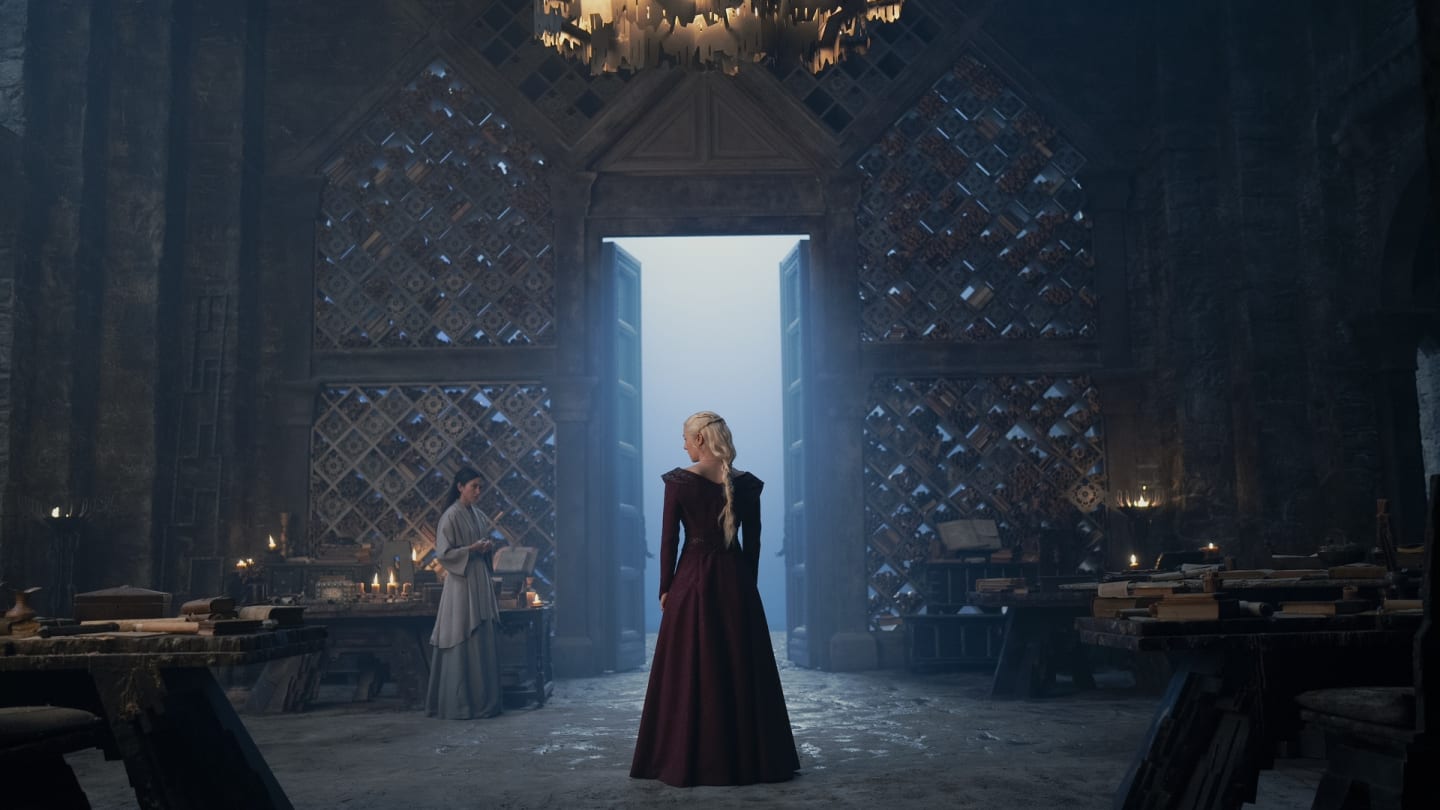
As a long-time fan of George R.R. Martin’s “A Song of Ice and Fire” series, I must admit that my initial excitement for House of the Dragon has been somewhat dampened by recent episodes, particularly the most recent one focusing on Daemon Targaryen.
The fifth episode of House of the Dragon’s second season doesn’t match up to the greatness of the fourth episode. This installment fails to advance the story effectively and instead offers background information that would be useful in a longer series, but not in one with only eight parts.
In Episode 5, most of the events portrayed deviate significantly from the account given in George R.R. Martin’s “Fire & Blood” book and were likely improvised for the television series. Let’s examine these discrepancies.
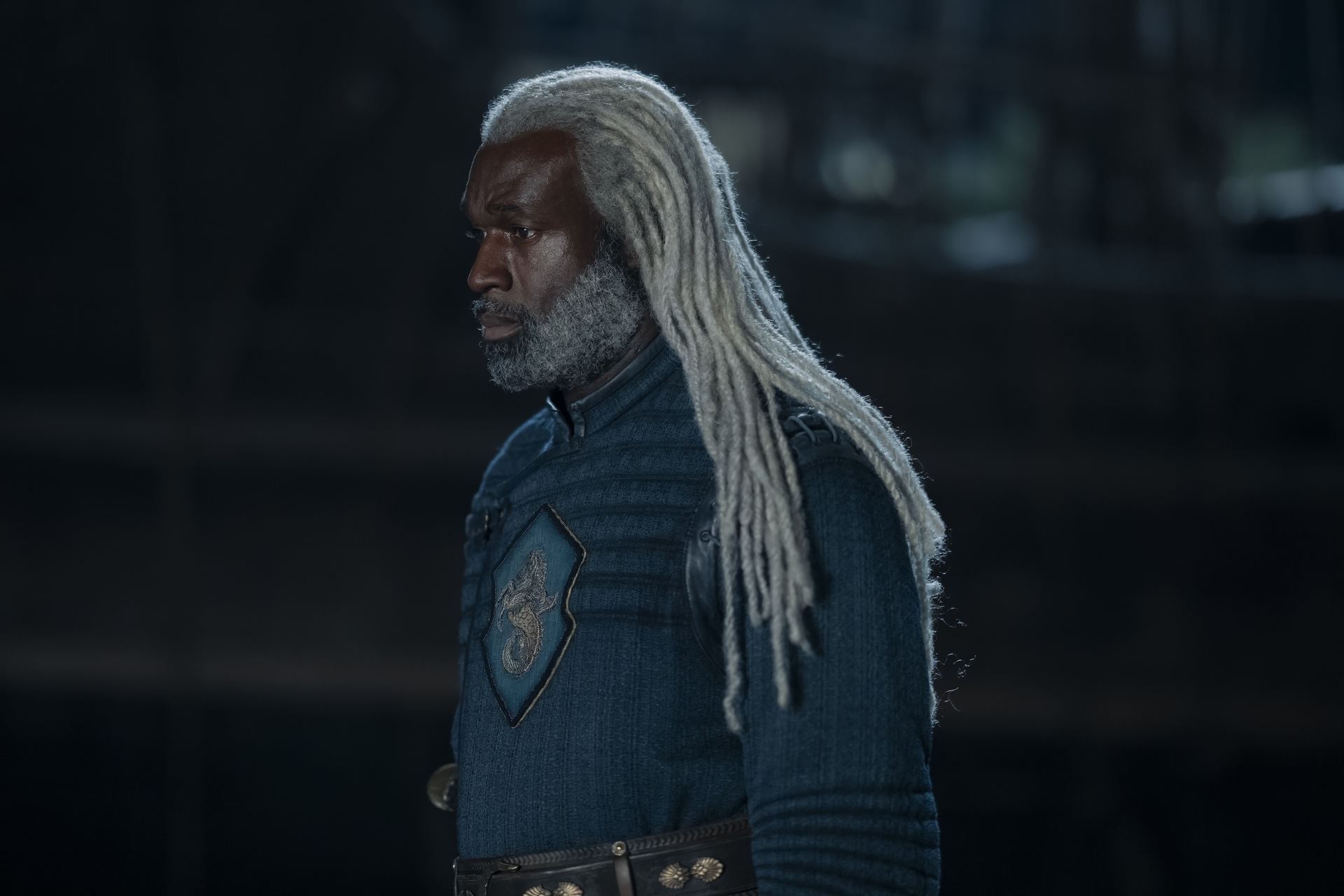
Dragonstone-Driftmark relations
After Princess Rhaenys met her untimely end at Rook’s Rest, the text recounts a bitter argument between Lord Corlys and Rhaenyra. The Sea Snake blamed Rhaenyra for his late wife’s death in battle and expressed his displeasure towards her. In the show, we observe Corlys expressing similar sentiments but only shows him mourning in his hall and wandering the streets of Spicetown, contemplating abandoning Rhaenyra’s cause. He confides these thoughts to his granddaughter Baela, who defends Rhaenyra and shares her belief that Rhaenys willingly accepted her heroic demise, much like Laena did, and how Baela aspires to do the same.
Rhaenyra seeks loyalty from her most trusted friend Baela and asks her to propose the position of Queen’s Hand to Corlys. In the novel, it is Jace who assumes this role instead. At this juncture in the narrative, the text focuses on Rhaenyra’s grief, pushing Jace into the limelight. This shift occurs in “Fire & Blood,” allowing for a more prominent role for Rhaenyra in the show and an intriguing conversation between her and Jace leading to the idea of discovering other Targaryen descendants to claim the unridden dragons. While not yet at the dragonseed concept, they’re on their way.
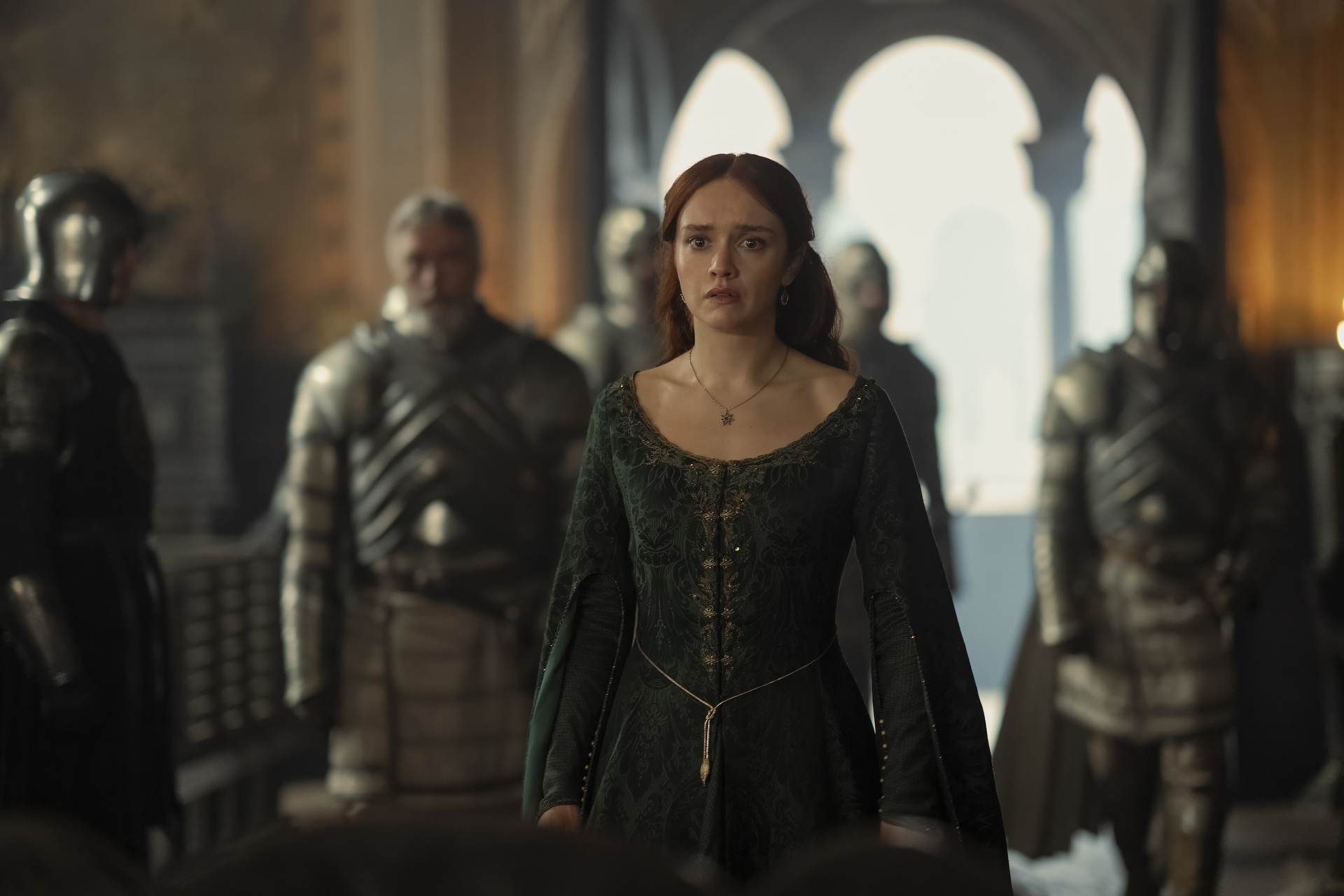
Alicent discovers the patriarchy is real and she doesn’t like it
In King’s Landing, the Green Council nearly chooses Aemond as Prince Regent, but Queen Dowager Alicent puts herself forward as an alternative candidate. She is cautious about her son’s rule due to concerns over his potential actions on the Iron Throne. However, it seems illogical for the council that dismissed Rhaenyra as queen based on her gender to consider Alicent as Regent. I understand Alicent’s apprehensions towards her son, but the notion that this council would accept a new regent after rejecting Rhaenyra is hard to believe. I sympathize with Alicent as a character, but I question the writing team for not providing a compelling storyline for such an essential character in the series.
From my gaming perspective, returning to the narrative, I felt a pang of sadness as I saw Alicent place her trust in Larys and Criston, only to discover they valued Aemond’s favor above her confidence. It was evident to all Council members that my influence mattered little, and it became apparent that Larys and Criston sought the Prince Regency under Aemond, with no mention of me as a potential candidate. However, it’s essential to note that in this game, Aemond does not hold the position of heir to the throne; instead, Maelor, another son of the king, exists and holds that title.
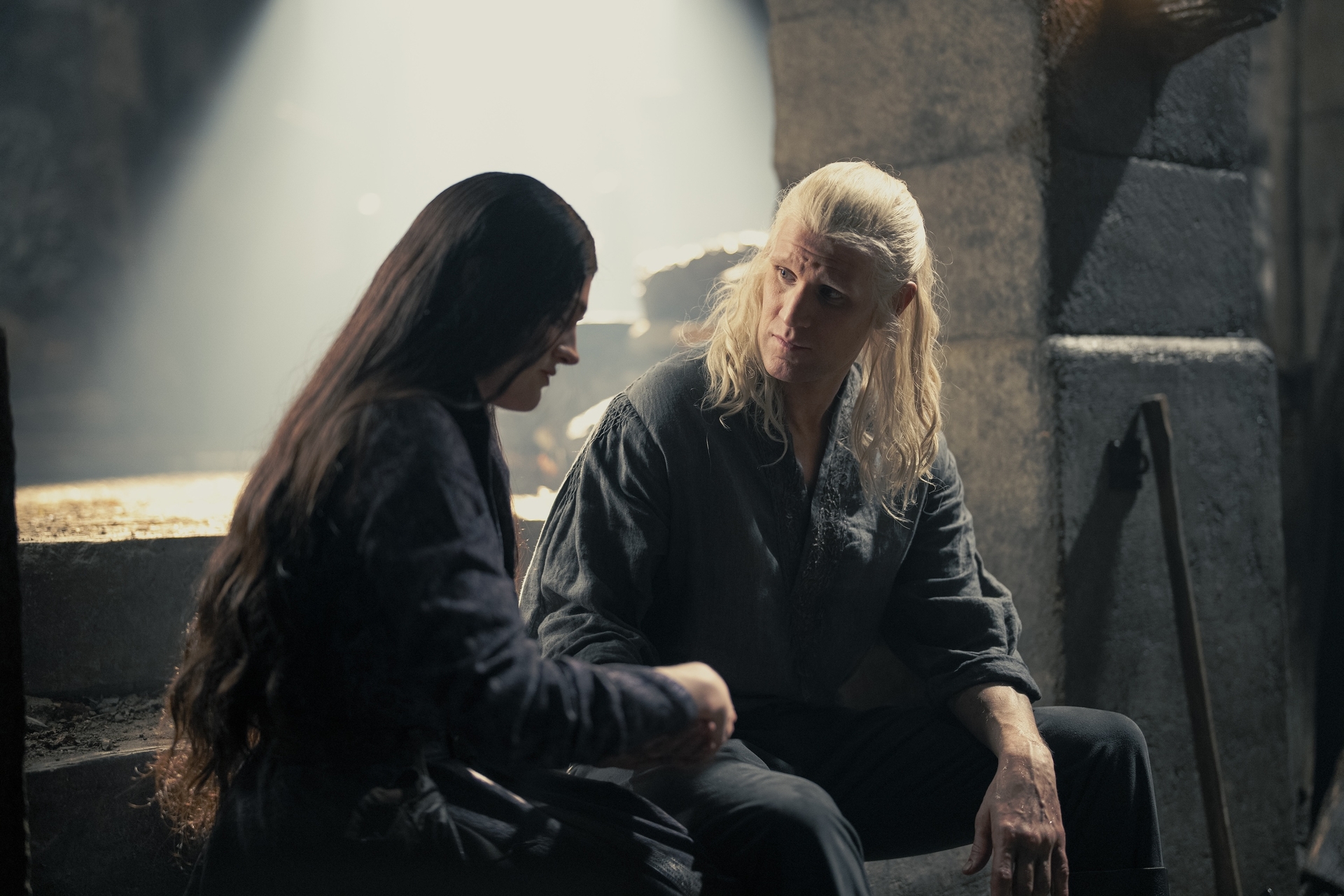
Unnecessary trouble in Harrenhal
The plotline of Daemon’s story, which can be considered as such, is entirely fabricated and diverges significantly from the source material. Despite this, Daemon continues to experience bizarre nightmares and visions instigated by Alys Rivers. I ponder whether Daemon endures these disturbing experiences in hopes of gaining more insight into his future. However, the writers’ decision to have Daemon dream about intimate encounters with his mother is an excessive and questionable addition, even for a show like “House of the Dragon.” I fail to see any significance in this plot development.
In simpler terms, is Alys Rivers convinced she’s resolving all of Daemon’s problems in a strange, pre-therapy manner reminiscent of Westeros? So far, she has made Daemon confront his own mortality, the guilt from Rhaenyra accusing and eventually dying by his hand, Laena questioning him about their daughters’ care, and now his supposed maternal issues. If Daemon continues consuming whatever potion Alys prepares, I strongly advise against it. Regardless of the motive behind this drawn-out ordeal (for both the readers and Daemon), “Fire & Blood” mentions that Daemon remained unaffected by Alys’s magic.
In one scene, Ser Simon Strong expresses Harrenhal’s financial struggles, mentioning that Larys Strong has taken the Strong family fortune with him. This situation reminded me of last season when Daemon stubbornly refused to ask for aid from his brother Viserys in the Stepstones due to pride. However, this predicament is not present in the book where it’s explicitly mentioned that “Prince Daemon seized not only Harrenhal but also the substantial wealth of House Strong in one swift move.”
In this installment, the sequence of actions is altered to make things more challenging for Daemon. Contrary to the source material where Ser Willem initiated guerrilla warfare against the Brackens on his own volition prior to the Battle of the Burning Mill (episode 3), in this version, Daemon proposes this strategy to the Blackwoods. This occurred after their encounter, which was well before the battle.
In the riverlands, raiders out of Raventree, flying Rhaenyra’s banners, crossed into the lands of House Bracken, burning crops, driving off sheep and cattle, sacking villages, and despoiling every sept they came on (the Blackwoods were one of the last houses south of the Neck who still followed the old gods).
In the latter part of the novel, it is Aemond and his dragon Vhagar who are responsible for torching farmlands and claiming the lives of peasant inhabitants in the Riverlands, with no involvement from Daemon.
Vhagar descended from the autumn sky again and again to lay waste to the lands and villages and castles of the riverlords. House Darry was the first to know the prince’s wroth. The men bringing in the harvest burned or fled as the crops went up in flame, and Castle Darry was consumed in a firestorm. Lady Darry and her younger children survived by taking shelter in vaults under the keep, but her lord husband and his heir died on their battlements, together with twoscore of his sworn swords and bowmen. Three days later, it was Lord Harroway’s Town left smoking. Lord’s Mill, Blackbuckle, Buckle, Claypool, Swynford, Spiderwood…Vhagar’s fury fell on each in turn, until half the riverlands seemed ablaze.
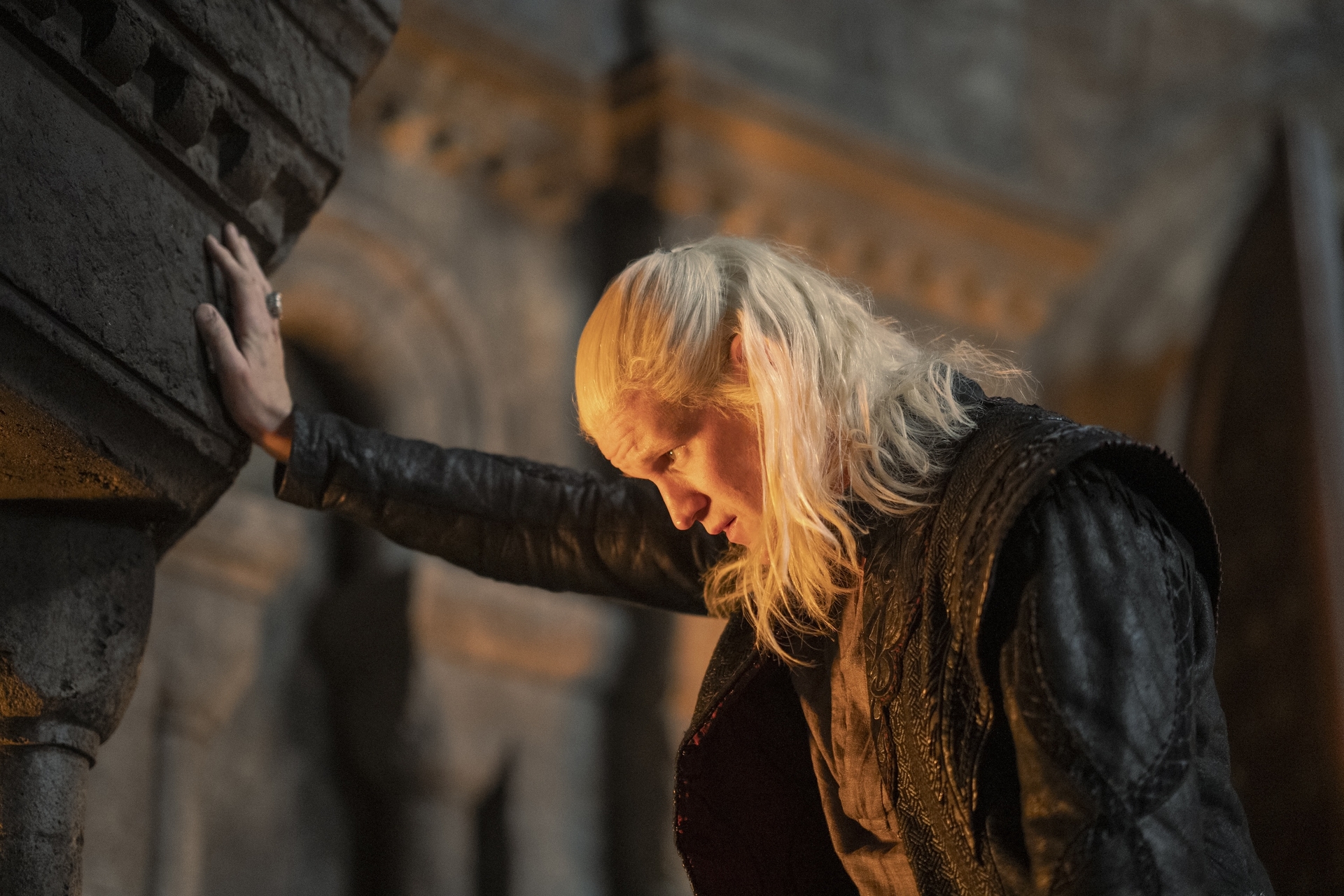
As someone who has closely followed the intricacies of House Targaryen’s history, I can certainly recognize the numerous parallels drawn between Daemon and Aemond in the original story. However, I find it hard to accept that Daemon should bear the burden of responsibility for the ruthless destruction of the Riverlands. After all, he didn’t issue the orders for such an atrocity.
In the show, it’s hard to believe that more than a dozen lords and ladies would boldly arrive at Harrenhal during the dead of night to confront Daemon about alleged wrongdoings and rebel against him. This contradicts the book canon and seems unusual for the series. It raises questions about whether anyone still fears Daemon or his dragon Caraxes enough to avoid such defiant actions that could potentially lead to their own demise.
When Prince Daemon sent forth his call to arms, they rose up all along the rivers, knights and men-at-arms and humble peasants who yet remembered the Realm’s Delight, so beloved of her father, and the way she smiled and charmed them as she made her progress through the riverlands in her youth. Hundreds and then thousands buckled on their swordbelts and donned their mail, or grabbed a pitchfork or a hoe and a crude wooden shield, and began to make their way to Harrenhal to fight for Viserys’s little girl.
Does the show’s plot present a new, unwieldy scenario for Daemon, with each move leading him into trouble? His desire to claim the throne while not openly rejecting Rhaenyra seems uncharacteristic and confusing. Throughout history, Daemon had ample chances to pursue his royal ambitions before and after his marriage to Rhaenyra.
It’s becoming publicly known and frequently discussed at Dragonstone and Harrenhal that Rhaenyra and Daemon are going through marital problems. The way these characters are being portrayed this season seems to indicate a lack of affection from the writer, as this prolonged storyline feels senseless and takes up valuable time – a luxury we don’t have with only three episodes left in the season.
In this episode, everything unfolding besides the canonical events or having no basis in the book feels like an addition to me as a fan. I’m open to deviations from the source material because sometimes they lead to exciting developments. However, I eagerly anticipate the upcoming episodes with hopes of more depth and development for the characters.
Other thoughts
In this paraphrased version, we introduce Lady Jeyne Arryn for the first time since episode 1, who was deeply missed. She proves to be a strong and formidable adversary, metaphorically speaking, for Rhaena or another character. These two women may discover shared experiences in their seemingly powerless situations.
That was NOT how I wanted to see Princess Alyssa Targaryen.
In this episode, the true star of King’s Landing, Cheese’s canine companion, graces our screens once more. I’m certain that many hearts skipped a beat upon seeing him. As George R.R. Martin put it, the inclusion of the dog as a character added an unexpectedly human touch to the Blood and Cheese saga.
When the Gold Cloak, upon hearing Mysaria’s name, didn’t inquire further and allowed Melinda into King’s Landing instead, it became evident that Mysaria wielded immense influence over the city. She and Daemon essentially hold the reins of power, and I eagerly anticipate the famous quote, “Daemon bestowed these cloaks upon us,” he declared, “and they remain gold regardless of how you look at them,” which can be found in “Fire & Blood.”
It might be one of Rhaenyra’s wisest moves this season to trust Baela and Mysaria for guidance. I truly hope she keeps relying on their counsel.
I deeply enjoyed the dynamic between Corlys and Baela. She represents the finest traits of her ancestors, which is evident to Corlys. “Granddaughter, I want to bestow the title of heir upon you.” “I am made of salt and sea. Driftmark belongs to flame and dragonfire.” Corlys’ attempt to uphold Rhaenys’ legacy was clear when he considered Baela as his successor; unfortunately, she declined. It’s unlikely that he will approach Rhaena (regrettably), but Rhaenys has left no ambiguity: worthy bastards deserve recognition and not concealment.
Read More
- Clash Royale Best Boss Bandit Champion decks
- Mobile Legends January 2026 Leaks: Upcoming new skins, heroes, events and more
- Vampire’s Fall 2 redeem codes and how to use them (June 2025)
- Clash Royale Furnace Evolution best decks guide
- M7 Pass Event Guide: All you need to know
- Clash of Clans January 2026: List of Weekly Events, Challenges, and Rewards
- Brawl Stars Steampunk Brawl Pass brings Steampunk Stu and Steampunk Gale skins, along with chromas
- Best Arena 9 Decks in Clast Royale
- Mobile Legends: Bang Bang (MLBB) Sora Guide: Best Build, Emblem and Gameplay Tips
- How “Hey Grok” turned X’s AI into a sexualized free-for-all
2024-07-15 05:42